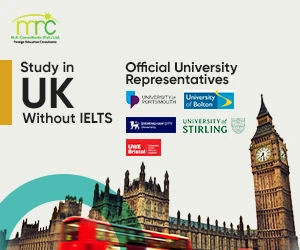IELTS Preparation Tips for Pakistani Students

Study abroad expert advice
Don't waste time! just fill the form to get help.
Preparing for the International English Language Testing System (IELTS) can feel overwhelming at first, but with the right strategies, resources, and dedication, achieving your desired band score becomes much easier. For Pakistani students aiming to study abroad, migrate, or work internationally, IELTS is a gateway to endless opportunities.
Develop a Smart Study Plan
Success in IELTS doesn’t come overnight—it requires consistent practice. Instead of cramming, set a study plan that fits your daily routine.
- Start Early: Begin preparation at least 6–8 weeks before your test date.
- Set Realistic Goals: Decide your target band score based on university or immigration requirements.
- Daily Practice: Dedicate at least 2–3 hours daily for IELTS study.
- Balance All Skills: Don’t focus only on one skill; practice Listening, Reading, Writing, and Speaking equally.
- Simulate Test Conditions: Take full-length practice tests to build confidence and manage time effectively.
Tip: Use a calendar to allocate days for each module and track your progress.
Use Reliable Preparation Resources
The right study material makes a huge difference in IELTS success. Avoid relying on random internet sources; instead, use trusted IELTS resources:
Books:
- The Official Cambridge Guide to IELTS
- Barron’s IELTS Superpack
- IELTS Trainer by Cambridge
- Target Band 7 by Simone Braverman
Websites & Apps:
- IELTS.org (official site)
- British Council’s free practice tests
- AEO Pakistan and IDP sample questions
- Mobile apps like Magoosh IELTS or IELTS Prep
Coaching vs. Self-study:
- Self-study is cost-effective if you are disciplined.
- IELTS coaching centers in Pakistan (e.g., in Lahore, Karachi, Islamabad) provide guided practice, feedback, and speaking mock tests.
Tip: Combine self-study with occasional professional feedback for best results.
Practice Each IELTS Module Effectively
Each IELTS section requires a different preparation strategy.
Listening:
- Practice listening to BBC podcasts, TED Talks, and English news channels.
- Focus on different accents (British, American, Australian).
- Take notes quickly while listening.
Reading:
- Read English newspapers, academic journals, and magazines.
- Practice skimming for main ideas and scanning for details.
- Time yourself to finish each passage within 20 minutes.
Writing:
- Learn essay structures for Task 2 (introduction, body paragraphs, conclusion).
- Practice describing charts/graphs for Task 1 (Academic).
- Focus on grammar, coherence, and vocabulary.
Speaking:
- Practice with friends or record yourself.
- Work on fluency, pronunciation, and confidence rather than memorizing answers.
- Prepare for common IELTS topics like education, travel, environment, and technology.
Tip: Record your practice sessions to identify mistakes and track improvement.
Avoid Common Mistakes Pakistani Students Make
Many candidates lose marks in IELTS due to repeated mistakes. Being aware of them helps you avoid traps.
- Not Managing Time: Spending too long on one question affects performance.
- Ignoring Instructions: Writing fewer words than required in writing tasks results in penalties.
- Using Difficult Words Incorrectly: Stick to simple and clear language.
- Overthinking in Speaking: Relax and treat it like a conversation.
- Not Practicing Under Exam Conditions: Real test pressure can reduce performance if you’re not prepared.
Tip: Take at least 3–4 full practice tests before the actual exam to avoid surprises.
Final Thoughts
IELTS preparation is about practice, consistency, and smart strategies. Pakistani students who dedicate time daily, use the right resources, and avoid common mistakes significantly improve their chances of scoring high. Remember, IELTS is not just an English exam—it’s a gateway to international education, career, and migration opportunities.
With the right preparation plan, you can confidently achieve your target band and move one step closer to your dreams.












